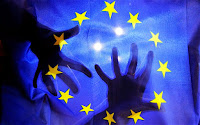 The Turkish government has accused Angela Merkel and Martin Schulz of practising the politics of populism and exclusion after the German election frontrunners agreed that the EU should break off negotiations over future Turkish membership. In a televised debate on Sunday evening, the German chancellor said she did not believe Turkey should become a member of the EU, and that she would take up with her EU partners the issue of ending accession talks with Ankara. Schulz, her Social Democrat rival in elections on 24 September, said if he became the next chancellor, he would be much more candid than Merkel in his criticism of Turkey’s contravention of human rights under the Turkish president, Recep Tayyip Erdoğan. Turkey, he said, had “crossed all the red lines” and therefore it could no longer become a member of the EU. He added that as German chancellor he would break off EU accession talks with Ankara. İbrahim Kalın, a spokesman for Erdoğa, said Merkel and Schulz had focused on Turkey in their television encounter – which was watched by between a third and a half of German voters – to divert attention from more pressing problems. “It is not a coincidence that our president, Erdoğan, was a main topic of the debate,” Kalın tweeted, criticising German politicians’ “indulgence in populism”. He continued: “Germany and Europe’s attacks on Turkey/Erdoğan, in ignoring necessary and pressing problems, are reflections of the narrowing of their horizons. “We hope the problematic atmosphere that made Turkish-German relations the victim of this narrow political horizon will end.” Merkel’s stance was more reserved than Schulz’s, largely because of her dependence on Ankara abiding by a deal to keep hundreds of thousands of migrants inside Turkey’s borders in return for financial aid, visa-free travel for Turks in Europe as well as the promise of faster EU membership talks.
The Turkish government has accused Angela Merkel and Martin Schulz of practising the politics of populism and exclusion after the German election frontrunners agreed that the EU should break off negotiations over future Turkish membership. In a televised debate on Sunday evening, the German chancellor said she did not believe Turkey should become a member of the EU, and that she would take up with her EU partners the issue of ending accession talks with Ankara. Schulz, her Social Democrat rival in elections on 24 September, said if he became the next chancellor, he would be much more candid than Merkel in his criticism of Turkey’s contravention of human rights under the Turkish president, Recep Tayyip Erdoğan. Turkey, he said, had “crossed all the red lines” and therefore it could no longer become a member of the EU. He added that as German chancellor he would break off EU accession talks with Ankara. İbrahim Kalın, a spokesman for Erdoğa, said Merkel and Schulz had focused on Turkey in their television encounter – which was watched by between a third and a half of German voters – to divert attention from more pressing problems. “It is not a coincidence that our president, Erdoğan, was a main topic of the debate,” Kalın tweeted, criticising German politicians’ “indulgence in populism”. He continued: “Germany and Europe’s attacks on Turkey/Erdoğan, in ignoring necessary and pressing problems, are reflections of the narrowing of their horizons. “We hope the problematic atmosphere that made Turkish-German relations the victim of this narrow political horizon will end.” Merkel’s stance was more reserved than Schulz’s, largely because of her dependence on Ankara abiding by a deal to keep hundreds of thousands of migrants inside Turkey’s borders in return for financial aid, visa-free travel for Turks in Europe as well as the promise of faster EU membership talks.İbrahim Kalın, a spokesman for Erdoğa, said Merkel and Schulz had focused on Turkey in their television encounter – which was watched by between a third and a half of German voters – to divert attention from more pressing problems.
“It is not a coincidence that our president, Erdoğan, was a main topic of the debate,” Kalın tweeted, criticising German politicians’ “indulgence in populism”.
He continued: “Germany and Europe’s attacks on Turkey/Erdoğan, in ignoring necessary and pressing problems, are reflections of the narrowing of their horizons.
“We hope the problematic atmosphere that made Turkish-German relations the victim of this narrow political horizon will end.”
Merkel’s stance was more reserved than Schulz’s, largely because of her dependence on Ankara abiding by a deal to keep hundreds of thousands of migrants inside Turkey’s borders in return for financial aid, visa-free travel for Turks in Europe as well as the promise of faster EU membership talks.


















